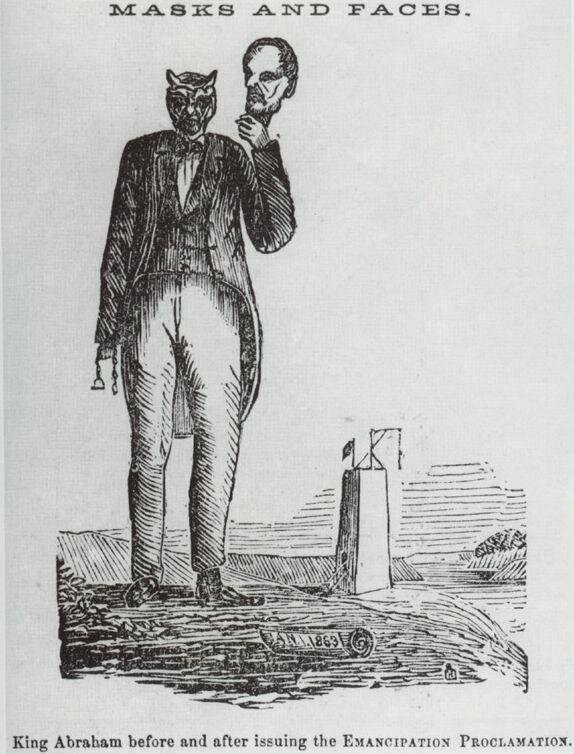Politics Ain't Bean-Bag
Politics Ain’t Bean-Bag
The level of vitriol and partisanship in our politics is shocking.
Lincoln as Satan
In discussing the President-elect, one newspaper stated: “…he is no more capable of becoming a statesman, nay, even a moderate one, than the braying ass can become a noble lion.” Another criticism: “His weak, wishy-washy, namby-pamby efforts, imbecile in matter, disgusting in manner, have made us the laughing stock of the whole world.” A Congressman complained: “His speeches have fallen like a wet blanket here. They put to flight all notions of greatness." When the President issued an Executive Order, it was harshly condemned: "We have no doubt that this Proclamation seals the fate of this Union as it was and the Constitution as it is…The time is brief when we shall have a DICTATOR PROCLAIMED, for the Proclamation can never be carried out except under the iron rule of the worst kind of despotism."
In the mid-term elections, the President’s party took a beating and lost its majority. Issues included inflation, taxation, corruption, and racism. Six large states that had voted for the President sent majorities to Congress from the opposition party. One report stated: "As to the politics of Washington, the most striking thing is the absence of personal loyalty to the President. It does not exist. He has no admirers, no enthusiastic supporters, none to bet on his head. If a…convention were to be held to-morrow, he would not get the vote of a State."
Which President experienced these criticisms and events? Abraham Lincoln
Draft Riots
The North instituted the first military draft in American history during the Civil War in 1863. The draft was hugely unpopular, and many believed the system favored the rich at the expense of the poor. Those subject to the draft resented that wealthier men could buy a ‘substitute’ for $300, a lot of money in those days. There were protests and riots. Troops were called out, and they shot into the crowd killing several people. This was not Kent State University, 1970, the Vietnam War. It was 1863, New York City, the worst draft riots in American history. The riots lasted several days, requiring the United States to dispatch forces from Gettysburg to New York City to restore order. Over 100 people died and many buildings burned. While soldiers were responsible for some of the deaths, most of them were the result of immigrant violence against African-Americans.
Lincoln as Orator
The most esteemed orator in America, Edward Everett, wrote in his diary of Lincoln: “[his] speeches thus far have been of the most ordinary kind, destitute of everything, not merely of felicity and grace, but of common pertinence. He is evidently a person of very inferior cast of character, wholly unequal to the crisis.” After a major Civil War battle, Everett was invited to provide an appropriate memorial speech. He spoke for two hours without notes, over 10,000 words. The talk was a tour-de-force of military and political history. Lincoln followed with his 272 word Gettysburg Address. The next day Everett wrote to Lincoln “I should be glad, if I could flatter myself, that I came as near to the central idea of the occasion in two hours, as you did in two minutes.”
Lincoln’s 1864 Re-Election
Pro McClellan (‘Little Mac’) March
Lincoln was re-nominated for President in 1864 and ran into difficulty with his Republican party over Reconstruction of the South. Lincoln favored a lenient policy for the South and issued a proclamation allowing Southern States to rejoin the Union once 10% of their voters had sworn allegiance to the U.S. and agreed to abide by Emancipation. Republicans felt this policy was too soft and passed the Wade-Davis bill in 1864 requiring a 50% loyalty oath and other provisions. Lincoln pocket vetoed the bill (A pocket veto occurs when the President allows Congress to adjourn before he has either signed or vetoed a bill; the bill does not become law in this case). Enraged Republicans criticized their Presidential nominee for "grave Executive usurpation" and "a studied outrage on the legislative authority."
Lincoln felt he was going to lose the 1864 election. The war seemed stalemated. Grant’s army sustained sizable casualties in the Spring campaign of 1864. Over six weeks including the battles of the Wilderness, Spotsylvania, and Cold Harbor, Grant incurred over 50,000 dead and wounded, and his army stalled outside of Richmond and Petersburg. In July 1864, a Confederate army raided Washington D.C., getting within a few miles of the capital, furthering the feeling that the war had a long duration left. In August 1864 Lincoln wrote a letter to his cabinet: "This morning, as for some days past, it seems exceedingly probable that this Administration will not be re-elected. Then it will be my duty to so cooperate with the Government President-elect, as to save the Union between the Election and the inauguration; as he will have secured his election on such ground that he cannot possibly save it afterwards."
1864 Election Poster Supporting McLellan
In late August 1864, the Democrats nominated General McClellan on a party platform stating that the War was a failure, peace now. This position was not particularly popular. And a few days later Sherman captured Atlanta. His six-word telegram "Atlanta is ours and fairly won" changed the political picture and Lincoln went on to re-election that November. Although he won easily in the Electoral College, Lincoln’s popular vote margin was surprisingly narrow in some States, in some cases a worse showing than in 1860.
Here we have Abraham Lincoln, severely criticized while alive, now one of our most revered Presidents. Showing that Presidential reputations take time to develop. As writer Finley Peter Dunne’s character, Mr. Dooley, an Irishman who pontificated on the day’s issues from a Chicago pub stated: “politics ain’t bean-bag.” Safe to say, as valid today as it was back in Lincoln’s day.
(Next Post in Lincoln Series - click here)



